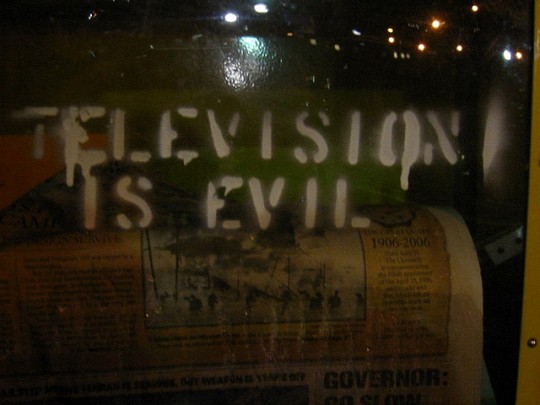In my post yesterday I touched on why I don’t think a la carte cable pricing is a terribly good option for consumers. Some people were quite upset with my having failed to explain fully why I’m not a fan, so allow me to explain my objections in slightly greater detail.
If you’ll recall, I said that the Parents Television Council’s push for legislation requiring cable providers to provide consumers the ability to pick and choose which channels they want rather than buying "bundles" or "tiers" of programming was "semi-reasonable." It’s the sort of argument that you can market to average voters on a moral level ("We shouldn’t be forced to subsidize these channels we hate!") and an economic level ("Viewers will save money by not being forced to pay for channels they hate!").
The reason I say this is a "semi-reasonable" argument is that I’m, frankly, not terribly impressed by either of these lines of attack.
First off, no one is "forcing" you to buy cable. If you’re so distraught at the idea of putting a dime a week into the pockets of the heathens at FX who are polluting the minds of your children, cut the cord and get your media via the Internet.*
Secondly, and more importantly, you probably aren’t going to save all that much money if you switch from bundles to a la carte. Here’s Timothy B. Lee’s simple explanation of what would happen: "Some people imagine that if they're getting 50 channels for $50 per month, they should be able to get individual channels at a dollar or two each. But cable companies would almost certainly respond to an a la carte requirement by jacking up the price of individual channels. The result could be that consumers pay about the same amount of money for dramatically fewer channels — a losing proposition for everyone."
And here’s James Surowiecki in the New Yorker: "there’s little evidence to suggest that à-la-carte packages would be generally cheaper than the current bundles. One recent paper on the subject, in fact, estimated the best-case gain to consumers at thirty-five cents a month. But even if it wasn’t a boon to consumers an à-la-carte system would inject huge uncertainty into the cable business, and many cable networks wouldn’t get enough subscribers to survive."
Now, for those who live the politicized life the whole point of the drive for a la carte pricing is to kill cable networks that displease them. This is why progressives have, for years, pushed for it: They think they can deprive Fox News of revenue and kill the conservative news network if enough liberals opt out of having to pay for it. And it’s why the PTC is pushing for the same thing: They want to kill FX and other purveyors of art they deem to be inappropriate. That’s the endgame here, though they know it won’t sell. So they instead couch their fight in economic terms and suggest that the parents of dead children shouldn't be "forced" to subsidize networks that portray an imaginary school shooting.
I’ll lay my cards out on the table: I oppose such a strategy because it would’ve strangled the Golden Age of Television in the crib. Anyone who has read up on the subject knows that the basic cable networks have been driven to produce an amazing variety of top notch original programming because doing so ensures their place in cable packages and helps them acquire higher affiliate fees.
As Brett Martin notes in Difficult Men, FX—a foundering cable company that showed nothing but reruns and movies everyone had seen a hundred times—developed The Shield in an effort to become "Free HBO." The Shield’s success spawned a coterie of brilliant, challenging TV, including Justified, Always Sunny in Philadelphia, and Sons of Anarchy, a show Jonah Goldberg described as "funny, prurient, violent, and rocket-paced" in a glowing 2010 essay.
Similarly, AMC—a network that showed old movies commercial free and its own executives derisively referred to as "the not-good Turner Classic Movies"—developed Mad Men because an exec said, "Look, we need The Sopranos." Mad Men’s success led to Breaking Bad and The Walking Dead and AMC’s lineup of popular, award-winning shows.
Without a nearly ubiquitous presence (Martin quotes one exec who notes that FX was available in 75 million homes, compared to HBO’s 23 million, before The Shield debuted) networks like FX and AMC wouldn’t have succeeded. And they had that ubiquitous presence because of bundling. To find an audience for a challenging program you need to have an audience available for you to find in the first place. In an a la carte environment, FX and AMC may well have died before being able to present the world their brilliant entertainment. I think it’s a tremendously good thing that we averted this tragedy; I’m sure the scolding scolds will disagree.
So yes, I’m opposed to a la carte pricing. I don’t think the federal government should be instructing businesses how to sell their product to customers, especially when we’re talking about something as inessential as television. I’m not particularly excited to live in a world in which I will pay the same amount of money for fewer cable channels. And creating a situation in which there are fewer cable networks—and thus, fewer networks on which exciting experimentation is taking place—would be a disaster for anyone who is interested in interesting television.
* No filth there!
Featured photo by anirvan.
